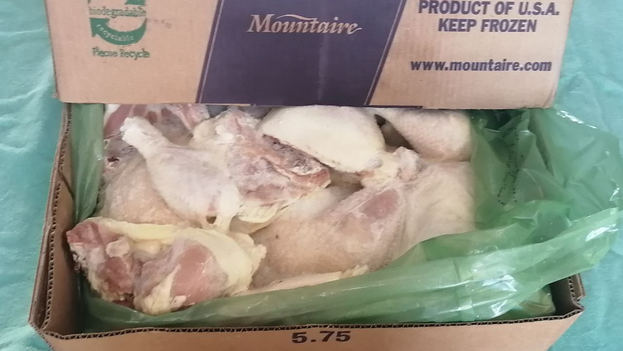
![]() 14ymedio, Madrid, 9 March 2023 — In January, 29,412 tons of chicken arrived in Cuba from the United States, 11% more than in December, and yet the consumer must go look for it in foreign exchange stores or in the informal market. The same goes for the price: the Cuban state took advantage of a fall in the cost of the product in the international market and spent 26% less in January than in December for a greater amount of meat, while the price to the public is still skyrocketing.
14ymedio, Madrid, 9 March 2023 — In January, 29,412 tons of chicken arrived in Cuba from the United States, 11% more than in December, and yet the consumer must go look for it in foreign exchange stores or in the informal market. The same goes for the price: the Cuban state took advantage of a fall in the cost of the product in the international market and spent 26% less in January than in December for a greater amount of meat, while the price to the public is still skyrocketing.
In the last month of 2022, a kilo of chicken cost $1.26, and in January it dropped to $0.93. The bird returns to prices that have not been seen since May 2022, when it was marketed for $0.91. In that month, an upward spiral began that reached its peak in October, with a cost of $1.29.
The decrease allowed Cuba to spend 27.2 million dollars in the first month of the year, instead of the 33 million dollars it invested a month prior, for the importation of 26,460 tons of chicken.
“We will have to wait to confirm if this was a temporary interruption in the trend,” says Cuban economist Pedro Monreal, who publishes and analyzes monthly the statistics for chicken, the product that the Cuban government buys the most from the U.S., despite its constant accusations about the damage caused by the “blockade.”
Cuba has exemptions to purchase food products and medicines in the United States, among other things. The condition, which the regime describes as unfair and contrary to international trade rules, is that Cuba must pay in cash, and in advance.
In July 2022, the United States Congress rejected an amendment presented by Democratic legislator Rashida Tlaib that proposed to expand agricultural trade with Cuba and authorize deferred payment for a year. It is not the only movement in Washington aimed at relaxing the restrictions.
This week, a bipartisan project arrived in the Senate, already presented in the same chamber a year ago, which proposed to “eliminate barriers” to American trade with the Island. Its defenders allege that the policy regarding human rights requirements would be maintained but economic opportunities for Americans and the Cuban population would be increased.
The United States International Trade Commission believes that if trade restrictions were lifted, exports of products such as wheat, rice or soy could increase by 166% in five years, to a total of 800 million dollars. However, Cuba’s lack of access to credit and financing as a result of its break with international organizations and its systematic non-payment of its debts leaves doubts about how the Island could deal with the payments.
In 2022, the figure paid by Cuba to the United States for purchases of agricultural inputs and food products reached a record 328.5 million dollars, an increase of 7.7% from the 304.7 million reported in 2021, according to the US-Cuba Economic and Commercial Council.
In 2022, the Island invested $295 million just to buy chicken from the United States, compared to $279.1 million in 2021. The figure has doubled since 2020, when the State spent $143.7 million, although that year it bought the least amount. Among the reasons is the rise in price of the product in international markets, which in 2022 was widespread.
The statistics of the Latin American Chicken Institute, which show a comparison of prices for the three main world exporters (United States, Brazil and the European Union), show the simultaneous rise that occurred in 2022, when the crisis in Ukraine and the increase in maritime transport costs began to push up prices.
The Cuban people have gone from aspiring to put pork on their table to dreaming of getting a piece of chicken, and they complain about having to spend long hours in line to get the meat, while they can hardly afford it in the informal market.
On the on-line site Revolico.com, the price of a chicken of approximately two kilos (4.4 pounds) is sold for an average of 1,500 pesos, approximately 12 dollars, more than half the minimum monthly wage in Cuba; or about $8.50 USD if Cuban pesos are changed on the foreign exchange black market. In any event, the consumer pays many times more for a kilo of chicken than the import price paid by the Cuban State.
Translated by Regina Anavy
____________
COLLABORATE WITH OUR WORK: The 14ymedio team is committed to practicing serious journalism that reflects Cuba’s reality in all its depth. Thank you for joining us on this long journey. We invite you to continue supporting us by becoming a member of 14ymedio now. Together we can continue transforming journalism in Cuba.
